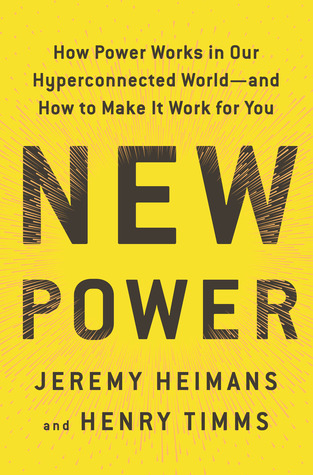More on this book
Community
Kindle Notes & Highlights
Read between
December 17, 2018 - November 20, 2019
It can be tempting to think of social media sites as merely virtual clubs or cafes, and less consequential than the things that unfold in parliaments or on
battlef...
This highlight has been truncated due to consecutive passage length restrictions.
But in fact platforms like Facebook are increasingly shaping and eclipsing what h...
This highlight has been truncated due to consecutive passage length restrictions.
When we think about the effect of vast new power models like Facebook and Uber on the wider world, we should apply what we call the
“circle test.”
The circle test asks us to consider the impacts of the platform, both on the actors inside its triangle an...
This highlight has been truncated due to consecutive passage length restrictions.
Should the “public square,” as Facebook is increasingly becoming, be privately owned and controlled?
It isn’t just policymakers, academics, and ethicists who should be thinking about applying the circle test. It’s us, as participants and super-participants.
the dynamics of how people are spending, raising, and investing money in a new power context.
In the twentieth century, we tended to think of our transactions in one of two distinct ways.
One was the basic economi...
This highlight has been truncated due to consecutive passage length restrictions.
The other kind of transaction was more altruistic.
you don’t expect a financial return on your contribution, or really anything other than the intangible benefit of knowing you are helping people
In recent years, we’ve seen these two kinds of returns—the economic and the altruistic—being blended more and more often.
Think of impact investing, which promises investors they can make good returns and do a little good for the world. Or think of the countless brands that promote themselves as causes—Patagonia, Toms, or Warby Parker, for example. This isn’t a new phenomenon—for years, public television has incentivized donations with the promise of free swag—but
but today it is becoming much mor...
This highlight has been truncated due to consecutive passage length restrictions.
we can think of as a multiplier:
the opportunity to participate.
you effectively “pay to dream.”
The value of this participation is so great that Citizens are gaining a return on investment even before the game exists.
When these returns come together, they create what we think of as the
“participation premium.”
Participation supercharges both:
it offers you citizenship in a lively community of fellow dreamers, and even offers the chance to change the game itself.
Whatever you’re “selling” today, there is great advantage in providi...
This highlight has been truncated due to consecutive passage length restrictions.
(Something in Return + Higher Purpose) x Participation =
Participation Premium
The great power of the participation premium is that it can lead to a decoupling of material value and price.
The rewards you get as a backer or participant are not simply tied to the value of the product involved. They are more complicated—and potentially
much more significant, for both “seller...
This highlight has been truncated due to consecutive passage length restrictions.
the company had already developed a community of two million people on social media.
Crucially, these people were not simply followers;
“IKEA effect,”
a tendency of people to place a higher value on self-made products.
People place a higher value on objects and experiences they are able to shape.
A rather mean-spirited YouTube commenter remarked of the name-reading video: “names of idiots who are so sad and alone they have to pay to be a part of something.”
(To which the internet might respond: Welcome to the twenty-first century.)
To generate funding in a new power world—be it via revenues, donations, investment capital, or loans—you need to develop a fresh set of skills, different from the ones needed to make things happen in the twentieth century.
These were both worlds in which no more than a few dozen people really mattered, and to succeed you needed to develop insider knowledge of a labyrinthine process.
The great skill was to carefully cultivate (and be careful never to irritate) the powers that be and the “tastemakers.”
Credentials mattered enormously. You needed to “serve your time” working your way up; you needed to go to the right schools. And once you’d broken into this system you ...
This highlight has been truncated due to consecutive passage length restrictions.
Of course, old power funding skills and connections still offer a huge leg up—just
But mastering these new skills can offer a way around closed, patronage-based systems.
And increasingly those mastering them are succeeding in getting their films made, scaling their businesses, and accruing economic value of all kinds.
Instead of relying on further bank loans or venture capital, it raised money—tens of millions of dollars of it—from its own consumers, and in the process, has become an early pioneer of
crowd equity,
with 24,000 of its consumers becoming...
This highlight has been truncated due to consecutive passage length restrictions.
blend power,
getting the best from old and new to keep crowd and investors content


